In 2010 Ireland had just four distilleries; today, there are over 40 who are all playing their part in the renaissance of Irish spirits. A similar picture emerges from the brewing sector: in 2008 there were 26 breweries and by 2021 there were 77.
This vibrant and inventive group of Irish producers are creating increasingly popular beers, stouts, whiskeys and a growing number of spirits that are becoming more and more popular with trade customers and consumers across the globe.
Here in the UK, demand for Irish drinks remains strong and accounts for 14% of total Irish drinks exports, despite the problems caused by Brexit. Irish beer exports contributed significantly to this growth, which increased by 31% year-on-year, with sales of premium whiskeys growing by 10% year-on-year.
The popularity of Irish drinks was clear when we attended the recent Meet the Makers event – organised by Bord Bia at the Irish Embassy in London earlier this month. Every producer we spoke to agreed that the UK continues to be a strong market, but many were frustrated by the problems caused by the UK’s departure from the EU.
There were 16 companies from across Ireland who were at the event, which was very well organised and extremely well attended, but this was hardly surprising given the range and quality of the drinks that were being promoted.
We met the majority of the producers, whose drinks we also sampled, and their details are summarised within this article.
Although we haven’t included information about every producer, at the end of the article there is the link to the document produced by Bord Bia, which does include the details of every company that attended the event.
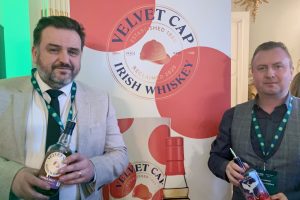 Blackwater Distillery, established in 2014, takes its name from the nearby Blackwater River on whose banks the company is situated. Its Irish name is ‘An Abhainn Mhor’ which means ‘The Big River’.
Blackwater Distillery, established in 2014, takes its name from the nearby Blackwater River on whose banks the company is situated. Its Irish name is ‘An Abhainn Mhor’ which means ‘The Big River’.
The company is in the village of Ballyduff Upper in West Waterford, where they hand craft a range of spirits including award-winning gins, vodka and traditional pot still Irish whiskey.
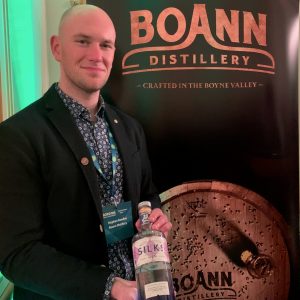 Boann Distillery is based in the heart of the Boyne Valley, where the Cooney family is reviving the time-honoured traditions of Ireland’s master distillers.
Boann Distillery is based in the heart of the Boyne Valley, where the Cooney family is reviving the time-honoured traditions of Ireland’s master distillers.
The family has a passion to create some of the finest whiskeys, using their specially designed and distinctive nano-copper pot stills and fine oak cask cellars, that helps ensure they produce a whiskey of distinct character with a real sense of provenance.
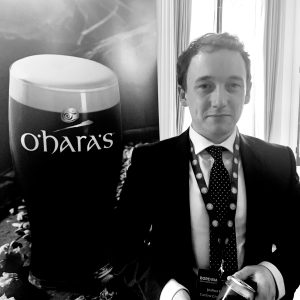 Carlow Brewing Company, also known as O’Hara’s Brewery, produces traditionally brewed craft Irish beers and their own style of international beers.
Carlow Brewing Company, also known as O’Hara’s Brewery, produces traditionally brewed craft Irish beers and their own style of international beers.
Their range includes stouts and ales, wheat beers and lagers, which are all branded with the brewery’s founders family name, O’Hara’s.
Each beer is produced using traditional brewing methods to create the high quality and authentic Irish beer styles that are no longer made by many of the larger breweries, using just four main ingredients; water, malts, hops and yeast.
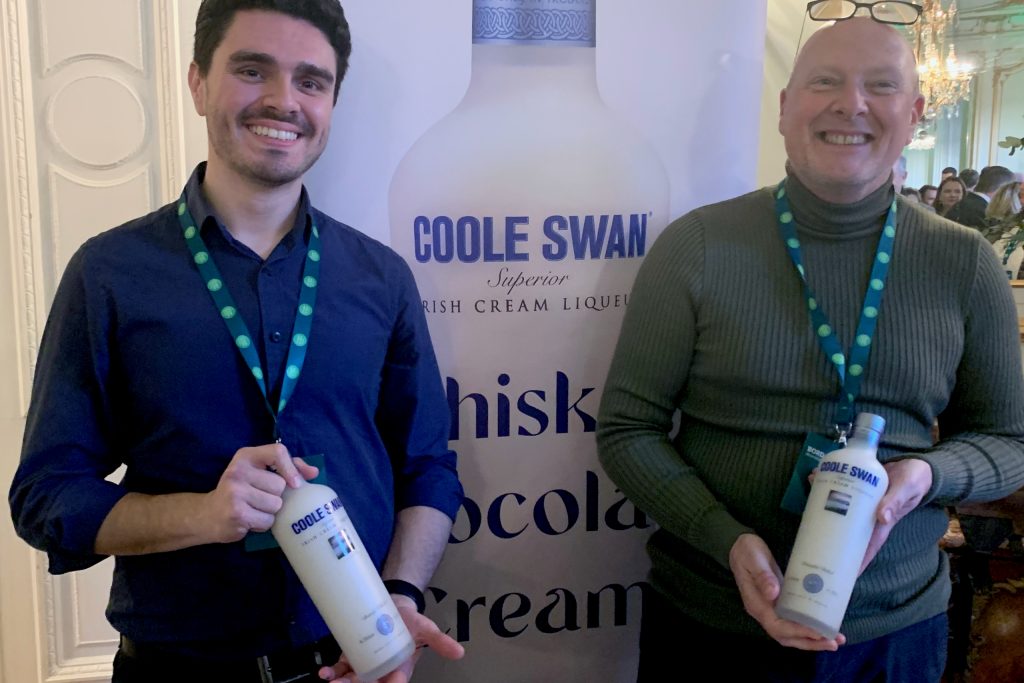 Coole Swan – produced in County Cavan – is the result of a vision and determination to create a contemporary Irish Cream Liqueur.
Coole Swan – produced in County Cavan – is the result of a vision and determination to create a contemporary Irish Cream Liqueur.
After 231 attempts, the creators were happy that they had the arrived at the best recipe, which perfectly balances smooth Irish whiskey, fresh cream and silky smooth Belgian white chocolate.
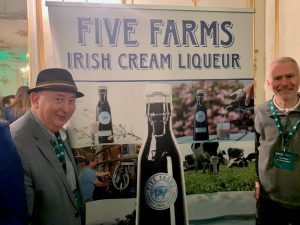 Five Farms Irish Cream Liqueur is the world’s first premium Irish cream liqueur, the result of a US-Irish joint venture between the long-established McCormick’s Distilling Company in western Missouri and Johnny Harte, from Raphoe, County Donegal.
Five Farms Irish Cream Liqueur is the world’s first premium Irish cream liqueur, the result of a US-Irish joint venture between the long-established McCormick’s Distilling Company in western Missouri and Johnny Harte, from Raphoe, County Donegal.
Along with the highest proportion of Irish whiskey that can be included in a cream liqueur, Five Farms contains cream from five family-run dairy farms in County Cork. The liqueur has was awarded the highest ever score for an Irish cream, winning the Chairman’s Trophy at the Ultimate Spirits Challenge, the prestigious global wine and spirits’ contest.
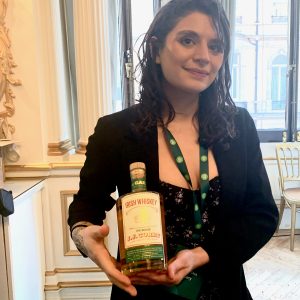 J.J. Corry is the curator of a diverse library of Irish whiskey flavours and blender of an award-winning portfolio of whiskeys.
J.J. Corry is the curator of a diverse library of Irish whiskey flavours and blender of an award-winning portfolio of whiskeys.
The company was founded by Louise McGuane who returned to her family farm to revive this lost craft of bonding and blending, which was once widespread in Ireland but all but disappeared in the early 1900s when the Irish whiskey industry came close to collapse.
J.J. Corry holds a diverse range of whiskey stocks supplied by established and new craft distilleries, which are then matured and blended in the J.J. Corry house style.
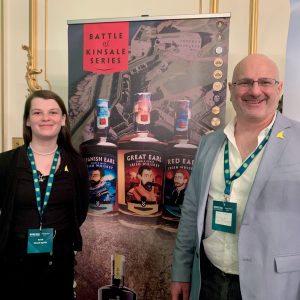 Kinsale Spirit Company was founded by Kinsale resident Tom O’Riordan, who has developed a range of award-winning spirits brands.
Kinsale Spirit Company was founded by Kinsale resident Tom O’Riordan, who has developed a range of award-winning spirits brands.
Tom started his distilling career with the purchase of a small still and began making small batches of gin in his kitchen working with his sister, Clodagh, a qualified distiller.
Using various botanicals, some traditional and some foraged from their local area, they produced over 60 batches of gin before they agreed on the final recipe that would be bottled and sold as Kinsale Gin.
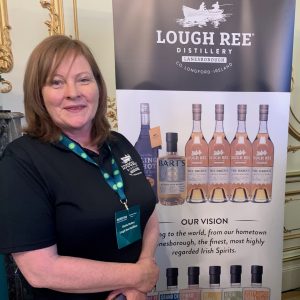 Lough Red Distillery, which was founded by the Clancy family, started as a topic of conversation over dinner.
Lough Red Distillery, which was founded by the Clancy family, started as a topic of conversation over dinner.
The idea was pursued and after much deliberation they finally decided where to locate their new venture: Lanesborough, in County Longford, where the family came from.
For the family, Lough Ree Distillery is all about connections: connecting the Irish whiskey tradition with modern technology, and connecting the slower pace of life in rural Ireland with the confidence of a new generation.
Today, the distillery produces an extensive range of award-winning whiskey, gin and vodka, which is enjoyed by an increasing number of customers in Ireland and beyond.
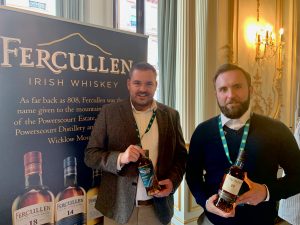 Powerscourt Distillery is based in the old mill on the grounds of the Powerscourt Estate, in County Wicklow, where there is one of Ireland’s most treasured gardens.
Powerscourt Distillery is based in the old mill on the grounds of the Powerscourt Estate, in County Wicklow, where there is one of Ireland’s most treasured gardens.
At the distillery, which is 30 minutes south of Dublin, there are three extravagant pot stills, six separate tasting rooms, a gift shop, a café, a screening room and adjoining maturation facilities.
They have the capacity to produce one million litres a year and currently they lay down about 100 casks a week in their purpose-built maturation warehouse. While their triple-distilled spirit matures, Powerscourt Distillery has released a sourced range of whiskeys named ‘Fercullen’.
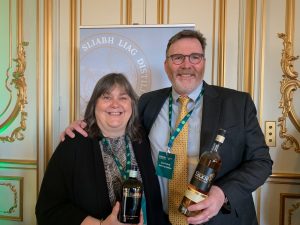 Sliabh Liag Dsitillers is located on the Sliabh Liag peninsula in Ireland’s north-western county of Donegal. When the distillery launched it was the first time in 175 years that spirits were being legally distilled in the county.
Sliabh Liag Dsitillers is located on the Sliabh Liag peninsula in Ireland’s north-western county of Donegal. When the distillery launched it was the first time in 175 years that spirits were being legally distilled in the county.
James and Moira Doherty, who established the distillery, relocated their family from Hong Kong to pursue their passion and continue a family tradition.
Their brands are inspired by James’s grandfather’s old poteen and whiskey recipes that were handed down from his grandmother. The couple are passionate about authenticity and have set out to recreate the rich spirits and smoky Irish whiskies that pre-date the industrial revolution.
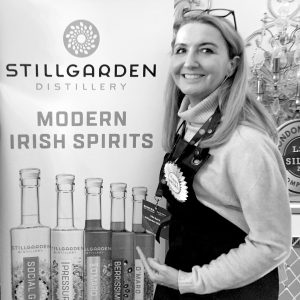 Stillgarden Distillery produces contemporary Irish spirits for the modern spirit drinker. Based in the vibrant quarter of Dublin 8 they are passionate spirit lovers who are looking to the future.
Stillgarden Distillery produces contemporary Irish spirits for the modern spirit drinker. Based in the vibrant quarter of Dublin 8 they are passionate spirit lovers who are looking to the future.
Their view is that: “enjoying spirits should be more modern, more fun and more vibrant with more flavours and more positive impacts on the planet and people.”
To make the spirits they use as many fresh, local and sustainably grown botanicals as they can and use science to capture amazing flavours for their growing range.
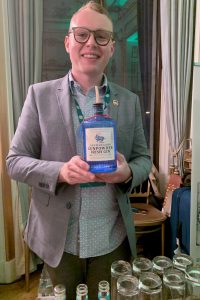 The Shed Distillery based in County Leitrim is so called because the team referred to the dilapidated building as “the shed” when they began construction.
The Shed Distillery based in County Leitrim is so called because the team referred to the dilapidated building as “the shed” when they began construction.
The distillery was founded in 2013 by serial entrepreneur P.J. Rigney, who has spent three decades in the drinks industry. His credits include being on the team that “invented” Baileys.
Drumshanbo Gunpowder Irish Gin is slow-distilled by hand in a gleaming medieval copper pot still, fired by steam.
This method combines vapour distillation of fresh citrus fruits with a special selection of oriental botanicals, including gunpowder tea and local Drumshanbo meadowsweet.
Every bottle is uniquely filled by hand, individually labelled and sealed, by the team at the distillery.
It was a pleasure to meet all the producers and to introduce them to our online magazine, several of whom we are already working with; we wish them all every success as they either enter or continue to serve the UK market.
Whilst every producer we spoke to was very positive about their future and passionate about their brands, it was the problems caused by Brexit that topped the list of concerns.
Let’s hope that in the very near future the Windsor Protocol is adopted by the UK and Irish parliaments, which should significantly improve cross-border trade – not only for these 16 producers, but with an increasing number of producers who are playing their part in the renaissance of Irish drinks.
Open the Meet the Makers brochure HERE
Photo credit: Simon Turton


